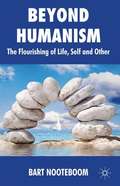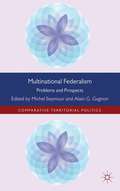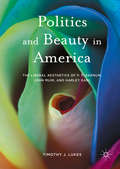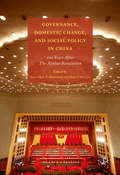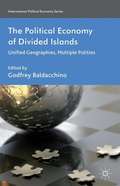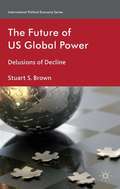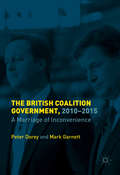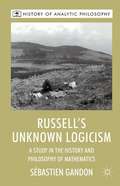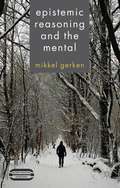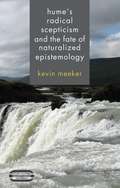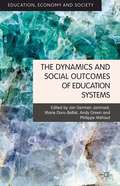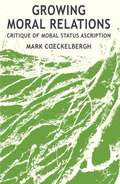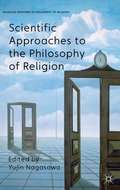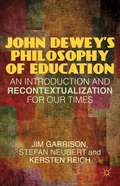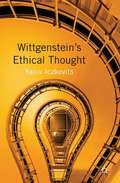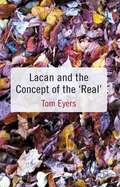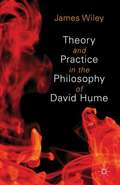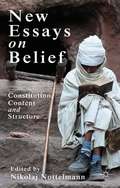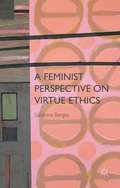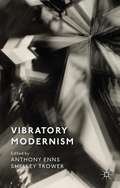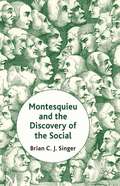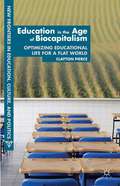- Table View
- List View
Beyond Humanism
by Bart NooteboomBeyond Humanism seeks to set humanism on a new footing. Enlightenment ideals of an autonomous, disconnected, and rational self are unrealistic. Together with Romantic dreams of authenticity and expression of the self it has had adverse effects, contributing to egotism and narcissism. Instead, this book employs a philosophy oriented towards the relationship between self and other. The book gives a critical discussion of religion, the Enlightenment and Romanticism. It seeks a way between Nietzsche's philosophy of the flourishing of life and Levinas's philosophy of the other. It argues that the self requires the other for its flourishing. The other is needed for the development of the self, for freedom also from the delusions and prejudices of the self, for transcendence of the self, for learning and innovation, for making sense in language, and for a life that aims not at a hereafter for the self but a hereafter that benefits others after one's death.
Spinoza’s Revolutions in Natural Law
by Andre Santos CamposThis first analysis of Spinoza's philosophy of law shows that he revolutionizes modern philosophy from within by developing an entirely new natural law theory connecting his ontology to radically democratic political views.
Memory, History, Justice in Hegel
by Angelica NuzzoThis reconstruction of the work of 'dialectical memory' in Hegel raises the fundamental question of the principle that presides on the articulation of history and indicates in Hegel's philosophy two alternative models of conceiving history: one that grounds history on 'ethical memory,' the other that sees justice as the moving principle of history.
Multinational Federalism
by Alain-G. Gagnon Michel SeymourA collection of state of the art reflections by fourteen leading experts in the field of multinational federalism. Seymour and Gagnon have gathered contributions from philosophers, political scientists and jurists dealing with the accommodation of peoples in countries like Belgium, Canada, Europe, Great Britain, India and Spain.
Politics and Beauty in America
by Timothy J. J. LukesThis book holds classical liberalism responsible for an American concept of beauty that centers upon women, wilderness, and machines. For each of the three beauty components, a cultural entrepreneur supremely sensitive to liberalism's survival agenda is introduced. P. T. Barnum's exhibition of Jenny Lind is a masterful combination of female elegance and female potency in the subsistence realm. John Muir's Yosemite Valley is surely exquisite, but only after a rigorous liberal education prepares for its experience. And Harley Earl's 1955 Chevrolet Bel Air is a dreamy expressionist sculpture, but with a practical 265 cubic inch V-8 underneath. Not that American beauty has been uniformly pragmatic. The 1950s are reconsidered for having temporarily facilitated a relaxation of the liberal survival priorities, and the creations of painter Jackson Pollock and jazz virtuoso Ornette Coleman are evaluated for their resistance to the pressures of pragmatism. The author concludes with a provocative speculation regarding a future liberal habitat where Emerson's admonition to attach stars to wagons is rescinded.
Governance, Domestic Change, and Social Policy in China: 100 Years after the Xinhai Revolution
by Jean-Marc F. Blanchard and Kun-Chin LinThis book constitutes the first comprehensive retrospective on one hundred years of post-dynastic China and compares enduring challenges of governance in the period around the collapse of the Qing dynasty in 1911 to those of contemporary China. The authors examine three key areas of domestic change and policy adaptation: social welfare provision, local political institutional reform, and social and environmental consequences of major infrastructure projects. Demonstrating remarkable parallels between the immediate post-Qing era and the recent phase of Chinese reform since the late-1990s, the book highlights common challenges to the political leadership by tracing dynamics of state activism in crafting new social space and terms of engagement for problem-solving and exploring social forces that continue to undermine the centralizing impetus of the state.
The Political Economy of Divided Islands
by Godfrey BaldacchinoThe authors investigate the exceptional political economy of the ten inhabited islands whose territory is divided amongst two or more countries: that are unitary geographical spaces but fragmented polities.
The Future of US Global Power
by Stuart S. BrownDispelling the myth of decline, Stuart Brown argues that the US continues to enjoy the economic, political, cultural and military underpinnings befitting a pre-eminent global power. He provides an analytical tour through the major domestic and foreign policy issues that will impact the United States' future position and role in the global system.
The British Coalition Government, 2010-2015
by Peter Dorey Mark GarnettThis book examines theformation and operation of the Conservative and Liberal Democrat coalitiongovernment from May 2010 to May 2015. The authors outline the factors thatenabled the union, including economic circumstances, parliamentary politics,the initially amicable relationship established between David Cameron and NickClegg, and the apparent ideological closeness of Conservative modernisers andOrange Book Liberal Democrats. The authors then analyse how these factorsshaped the policy agenda pursued over the five years, including the issues ofdeficit reduction, public sector reform, and welfare reduction, beforediscussing the tensions that developed as a result of these decisions. Ultimately, relations between the coalition partners steadily became lessamicable and more acrimonious, as mutual respect gave way to mutualrecrimination.
Russell’s Unknown Logicism: A Study in the History and Philosophy of Mathematics (History of Analytic Philosophy)
by Sébastien GandonIn this excellent book Sebastien Gandon focuses mainly on Russell's two major texts, Principa Mathematica and Principle of Mathematics, meticulously unpicking the details of these texts and bringing a new interpretation of both the mathematical and the philosophical content. Winner of The Bertrand Russell Society Book Award 2013.
Epistemic Reasoning And The Mental
by Mikkel GerkenEpistemic Reasoning and the Mental integrates the epistemology of reasoning and philosophy of mind. The book contains introductions to basic concepts in the epistemology of inference and to important aspects of the philosophy of mind. By examining the fundamental competencies involved in reasoning, Gerken argues that reasoning's epistemic force depends on the external environment in ways that are both surprising and epistemologically important. For example, Gerken argues that purportedly deductive reasoning that exhibits the fallacy of equivocation may nevertheless transmit epistemic warrant from its premise-beliefs to its conclusion-belief. This view is contrary to orthodoxy according to which such reasoning must be valid. But Gerken shows how this novel and unorthodox view is integrated in a psychologically plausible account of our reasoning competencies and a general epistemological framework. What emerges is an approach to the philosophy of reasoning that is informed and constrained by both epistemology and philosophy of mind.
Hume’s Radical Scepticism and the Fate of Naturalized Epistemology
by Kevin MeekerWas David Hume radically sceptical about our attempts to understand the world or was he merely approaching philosophical problems from a scientific perspective? Most philosophers today believe that Hume's outlook was more scientific than radically sceptical and that his scepticism was more limited than previously supposed. If these philosophers are correct, then Hume's approach to philosophy mirrors the approach of many contemporary philosophers. This similarity between Hume and many aspects of contemporary philosophy suggests that we should try to understand Hume not as an historical relic but as a partner in a continuing philosophical dialogue. When we look closely at Hume's thoughts about human understanding, we find that Hume's scepticism emerges very insistently in the context of Hume's scientific approach. This book tries to come to terms with Hume's scepticism in a way that sheds light on contemporary philosophy and its relationship to science.
The Dynamics and Social Outcomes of Education Systems
by Andy Green Jan Germen Janmaat Marie Duru-Bellat Philippe M�hautThis collection critically examines the dynamics and social outcomes of systems of lifelong learning.
Growing Moral Relations
by Mark CoeckelberghNew scientific and technological developments challenge us to reconsider our moral world order. This book offers an original philosophical approach to this issue: it makes a distinctive contribution to the development of a relational approach to moral status by re-defining the problem in a social and phenomenological way.
Scientific Approaches to the Philosophy of Religion
by Yujin NagasawaThe philosophy of religion, one of the oldest areas of philosophy, has been advanced mainly through conceptual thinking. However, over the last few decades scientists have made discoveries with significant implications for this philosophical domain. Scientific Approaches to Philosophy of Religion opens new perspectives by applying scientific approaches to central problems in the field. The book's contributors tackle perennial problems in philosophy of religion by referring to relevant findings and theories in cognitive science, anthropology, developmental psychology, decision theory, biology, physics and cosmology. They address a wide range of topics, such as divine attributes; God, creation and evolution; God and the universe; religious beliefs; religious tolerance and disagreement; and the compatibility of science and religion.
John Dewey’s Philosophy of Education
by Jim Garrison Kersten Reich Stefan NeubertJohn Dewey is considered not only as one of the founders of pragmatism, but also as an educational classic whose approaches to education and learning still exercise great influence on current discourses and practices internationally. In this book, the authors first provide an introduction to Dewey's educational theories that is founded on a broad and comprehensive reading of his philosophy as a whole. They discuss Dewey's path-breaking contributions by focusing on three important paradigm shifts - namely, the cultural, constructive, and communicative turns in twentieth-century educational thinking. Secondly, the authors recontexualize Dewey for a new generation who has come of age in a very different world than that in which Dewey lived and wrote by connecting his philosophy with six recent and influential discourses (Bauman, Foucault, Bourdieu, Derrida, Levinas, Rorty). These serve as models for other recontexualizations that readers might wish to carry out for themselves.
Wittgenstein’s Ethical Thought
by Yaniv IczkovitsExploring the ethical dimension of Wittgenstein's thought, Iczkovits challenges the view that Wittgenstein had a vision of language and subsequently a vision of ethics, showing how the two are integrated in his philosophical method, and allowing us to reframe traditional problems in moral philosophy considered as external to questions of meaning.
Lacan and the Concept of the ‘Real’: Charities, Civil Society And The Voluntary Sector Since 1945
by Tom EyersThis is the first book in English to explore in detail the genesis and consequences of Lacan's concept of the 'Real', providing readers with an invaluable key to one of the most influential ideas of modern times.
Theory and Practice in the Philosophy of David Hume
by James WileyAn original interpretation of Hume's philosophy as centered on the relationship between theory and practice. The author argues that Hume's Essays and History represent a humanist practical philosophy derived from the speculative philosophy of A Treatise of Human Nature and the Enquiries .
Knowledge First?
by Aidan McglynnAccording to a long tradition, questions about the nature of knowledge are to be answered by analyzing it as a species of true belief. In light of the apparent failure of this approach, knowledge first philosophy takes knowledge as the starting point in epistemology. Knowledge First? offers the first overview of this approach.
New Essays on Belief
by Nikolaj NottelmannBelief is a fundamental concept within many branches of contemporary philosophy and an important subject in its own right. This volume comprises 11 original essays on belief written by a range of the best authors in the field.
A Feminist Perspective on Virtue Ethics
by Sandrine BergesA Feminist Perspective on Virtue Ethics provides of historical survey of feminist virtue ethics, and shows how the ethical theorizing of women in the past can be brought to bear on that of women in the present.
Vibratory Modernism
by Shelley Trower Anthony EnnsVibratory Modernism is a collection of original essays that show how vibrations provide a means of bridging science and art two fields that became increasingly separate in the nineteenth and early twentieth centuries. "
Montesquieu and the Discovery of the Social
by Brian C. J. SingerMontesquieu is often considered the first social thinker. Today, when 'the end of the social' has been proclaimed, it is time to reconsider its beginnings. In a wide-ranging, original interpretation of The Spirit of the Laws, this book explores what did it mean to 'discover the social', and what can it mean to recover the social today?
Education in the Age of Biocapitalism
by Clayton Pierce"This book is an in-depth examination of the growing alignment between powerful global bioindustries and education reform in the U. S. Utilizing a biopolitical methodology, the book focuses on how value-added measures and other neoliberal strategies embedded in policies such as 'race to the top' are involving schools in a project to manage and regulate educational life for competing in a new 'flat world'. Understanding the educational present, this work argues, requires individuals to consider what advanced industrialized nations across the globe are viewing as the future. Biocapitalist development in areas such as genetic engineering, drug therapies, and cellular cloning is the promissory future driving nations like the U. S. to out-compete and out-educate one another at any cost. This book assesses the implications for education in the biocapitalist era and points to alternative futures not based on such a vision of life and its productive potential"--
